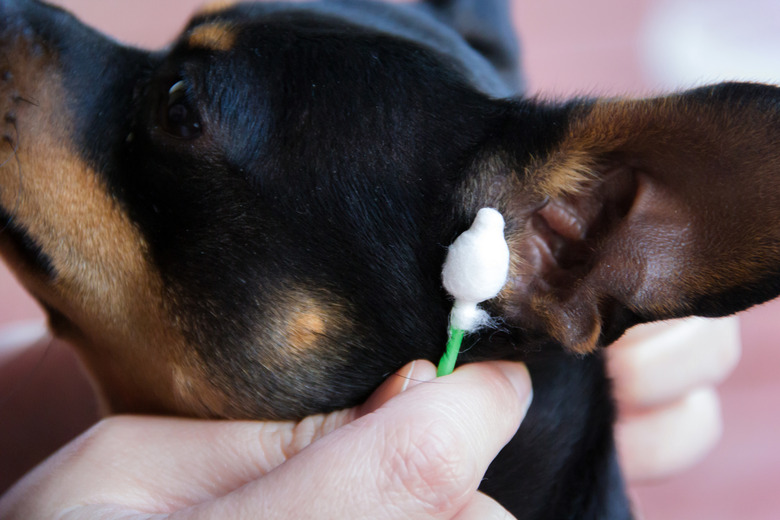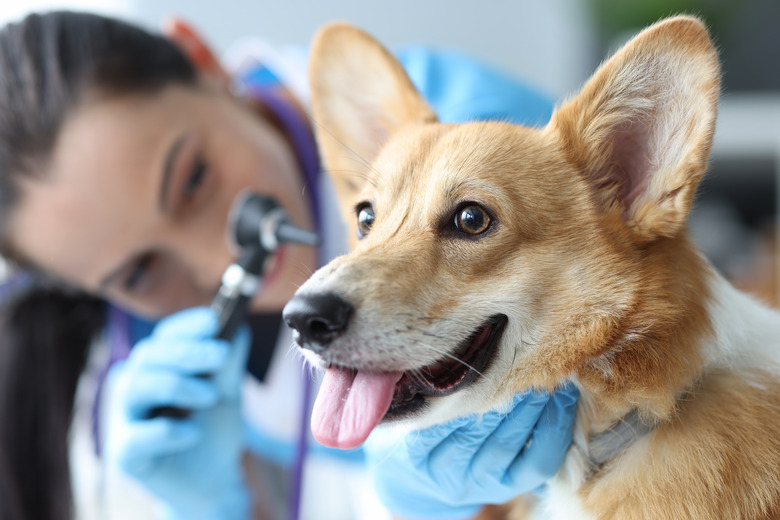How To Clean A Dog's Ears With Vinegar & Water
Vinegar and water solutions are easy to use and helpful for routinely cleaning your dog's ears. Mix the solution, apply it to your dog's ears and gently wipe out the ear. Because vinegar is largely safe, inexpensive, and easy to acquire, it is an excellent tool to have in your dog-care arsenal.
Benefits of vinegar
Benefits of vinegar
By cleaning out your dog's ears with a combination of water and white vinegar, dog ear yeast infections will disappear. Vinegar is strongly acidic but used properly it can dissolve earwax and safely lower the pH of your dog's ears. Lowering the pH makes the environment in your dog's ears less hospitable to pathogenic bacteria and yeast, which promotes good ear health. Vinegar kills bacteria, viruses, and fungi.
Vinegar ear wash for dogs
Vinegar ear wash for dogs
It is important to dilute the vinegar with water, as it may irritate the sensitive skin of a dog's ears. Combine one part vinegar with one part water to create an acceptable mixture. Once the mixture is ready, allow it to sit for 20 to 30 minutes so it warms to room temperature; introducing cold liquids into your dog's ear canal can cause discomfort.
You can use white vinegar, or if you prefer, apple cider vinegar; both have similar properties and work for cleaning your dog's ears. However, apple cider vinegar can stain white and light-colored fur. If your dog is white or has light-colored fur, use distilled white vinegar instead.
Cleaning ears with white vinegar
Cleaning ears with white vinegar
First, check the inside of your dog's ear to see if it's been punctured. If you notice a puncture or bleeding, do not use a vinegar solution and contact your veterinarian immediately.
If the eardrum isn't perforated, you can use an eyedropper to place several drops of a vinegar solution in your dog's ear canal. Mix a 50/50 solution of water and either white or apple cider vinegar. Fill the ear canal with the mixture while avoiding getting it in their eyes, which can cause pain or irritation, or on their body. Gently fold his earflap over the opening in his ear and massage the area to ensure that the vinegar saturates all of the ear's surfaces.
Next, allow your dog to shake his head, which will empty most of the vinegar from his ear canal. Clean the ear with a cotton swab to dry any residual vinegar and remove wax and debris. Perform this type of routine cleaning weekly or as often as your vet recommends. Many dogs dread having their ears cleaned, so end each cleaning session by praising your pup and providing him with a treat.
Veterinary advice on ear infections
Veterinary advice on ear infections
While vinegar and water solutions are effective for dissolving earwax and routine cleaning, consult your veterinarian before attempting home treatment if your dog displays signs of an ear infection. Ear infections often cause your dog's ears to smell, bleed or look red, scaly, or irritated. Your veterinarian is likely to treat your dog's infection with medications rather than vinegar. Vinegar should not be used on dogs with perforated eardrums as it can lead to the loss of hearing or a head tilt.
If you use a vinegar ear wash for dogs but are not seeing any improvement, talk to your veterinarian. If you notice your dog is sensitive to the vinegar solution or in pain, contact your veterinarian immediately.
Preventing ear infections
Preventing ear infections
Part of being a responsible pet parent means taking care of your dog's hygiene. In addition to routinely cleaning their teeth and brushing their fur, you need to clean their ears at least once a week. Always dry your dog's ears after a trip to the lake, ocean, or pool, as wet ears are a perfect breeding ground for yeast and bacteria to grow. Additionally, check your dog's ears intermittently for any pests, foreign objects, or blood to make sure they are in tip-top shape.


